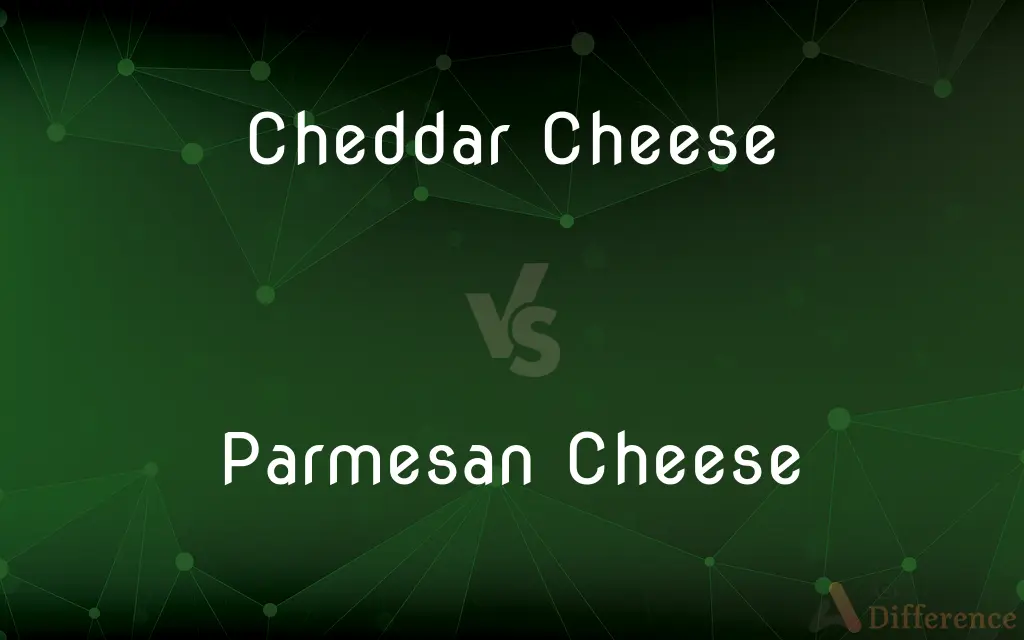Cheddar Cheese vs. Parmesan Cheese — What's the Difference?
By Tayyaba Rehman — Published on October 30, 2023
Cheddar Cheese is a smooth, creamy, and sometimes sharp-tasting cheese originating from England, while Parmesan Cheese is a hard, granular, and aged cheese with a strong, savory flavor, originating from Italy.

Difference Between Cheddar Cheese and Parmesan Cheese
Table of Contents
ADVERTISEMENT
Key Differences
Cheddar Cheese and Parmesan Cheese are both popular varieties of cheese with distinct characteristics, taste profiles, and origins. Cheddar Cheese, originating from the English village of Cheddar in Somerset, typically has a smooth and creamy texture and can range in flavor from mild to extra sharp. It’s often used in a variety of dishes due to its versatility and melting properties. On the contrary, Parmesan Cheese, originally from the Parma region of Italy, is a hard, aged cheese known for its rich, savory flavor and granular texture, commonly grated over pasta dishes, soups, and salads.
The production processes for Cheddar Cheese and Parmesan Cheese also differ significantly. Cheddar Cheese is often made by ‘cheddaring,’ a unique process where the curds are cut, drained, and stacked repeatedly, impacting its final texture and flavor. It can be aged for varying durations, with longer aging resulting in a sharper taste. Parmesan Cheese undergoes a meticulous aging process, often for over a year, to develop its distinctive robust flavor and crystalline texture, and it’s strictly regulated in Italy, ensuring quality and authenticity.
The nutritional compositions of Cheddar and Parmesan are also distinct. Cheddar Cheese usually has a higher moisture content, resulting in a lower fat content per gram, but it's often consumed in larger quantities due to its softer, more versatile nature. Parmesan Cheese, being aged and having a lower moisture content, tends to have a higher concentration of fat and protein per gram, but it’s usually consumed in smaller, more flavorful portions, adding a burst of flavor to dishes with less volume.
In terms of culinary applications, Cheddar Cheese is celebrated for its versatility, melting beautifully to add creaminess to dishes such as sandwiches, burgers, and macaroni and cheese. Its varying degrees of sharpness can also suit different flavor preferences. Parmesan Cheese is revered for its ability to elevate dishes with its intense, umami-rich flavor, and it’s often used as a finishing touch to enhance the taste of Italian cuisines like pasta and risotto, as well as being a flavorful component in various recipes.
In summary, Cheddar Cheese is a creamy, versatile cheese known for its smooth texture and range of flavors, originating from England, while Parmesan Cheese is an Italian-origin, robustly flavored, hard, and granular cheese, known for enhancing dishes with its savory richness. The differences in their origin, texture, flavor, production, and culinary applications make them unique in the world of cheeses.
ADVERTISEMENT
Comparison Chart
Origin
England, specifically the village of Cheddar
Italy, specifically the Parma region
Texture
Smooth and creamy
Hard, granular, and crystalline
Flavor
Mild to sharp
Strong, savory, and umami-rich
Culinary Use
Versatile; melts well in various dishes
Typically grated over dishes for a flavorful finish
Aging Process
Can be aged for varying durations
Usually aged for over a year
Compare with Definitions
Cheddar Cheese
It is processed by a unique method known as ‘cheddaring’.
The ‘cheddaring’ process gives Cheddar Cheese its unique texture and flavor.
Parmesan Cheese
Has a high concentration of fat and protein due to low moisture content.
Parmesan Cheese adds a burst of umami flavor with minimal volume to dishes.
Cheddar Cheese
A versatile cheese known for its smooth and creamy texture.
Cheddar Cheese melts beautifully, making it a popular choice for grilled cheese sandwiches.
Parmesan Cheese
Strictly regulated and usually aged for over a year.
The aging process of Parmesan Cheese develops its distinctive robust flavor and texture.
Cheddar Cheese
Can range in flavor from mild to extra sharp based on aging.
Aged Cheddar Cheese offers a sharp, distinctive flavor suitable for gourmet dishes.
Parmesan Cheese
Originates from the Parma region of Italy.
True Parmesan Cheese reflects the culinary heritage of the Parma region.
Cheddar Cheese
Known for its melting properties and used in a variety of dishes.
Cheddar Cheese adds a creamy texture to macaroni and cheese.
Parmesan Cheese
A hard, granular cheese known for its rich, savory flavor.
Parmesan Cheese is often grated over pasta to enhance its flavor.
Cheddar Cheese
Originating from the English village of Cheddar in Somerset.
The village of Cheddar is the namesake for Cheddar Cheese.
Parmesan Cheese
Often used as a flavorful component in various recipes.
Parmesan Cheese elevates the taste of risotto by adding a savory richness.
Common Curiosities
What region is Parmesan Cheese associated with?
Parmesan Cheese is associated with the Parma region of Italy.
Can Cheddar Cheese range in flavor?
Yes, Cheddar Cheese can range in flavor from mild to extra sharp based on aging.
Is Parmesan Cheese usually strong in flavor?
Yes, Parmesan Cheese is known for its strong, savory, and umami-rich flavor.
Is Cheddar Cheese versatile in culinary applications?
Yes, Cheddar Cheese is versatile and melts well, suitable for various dishes like sandwiches and macaroni and cheese.
Is the production of Parmesan Cheese strictly regulated?
Yes, the production of Parmesan Cheese is strictly regulated, especially in Italy, to ensure quality and authenticity.
How is Parmesan Cheese typically used in dishes?
Parmesan Cheese is typically grated over dishes like pasta and risotto as a flavorful finish.
Is Parmesan Cheese usually consumed in smaller, flavorful portions?
Yes, due to its strong flavor and lower moisture content, Parmesan Cheese is usually consumed in smaller, more flavorful portions.
Where does Cheddar Cheese originate from?
Cheddar Cheese originates from the village of Cheddar in Somerset, England.
Is Cheddar Cheese known for its smooth and creamy texture?
Yes, Cheddar Cheese is characterized by a smooth and creamy texture.
Is Cheddar Cheese often consumed in larger quantities?
Yes, due to its creamy and versatile nature, Cheddar Cheese is often consumed in larger quantities.
Does Cheddar Cheese have a unique processing method?
Yes, Cheddar Cheese is often made by a unique method known as ‘cheddaring’.
How is the texture of Parmesan Cheese typically described?
Parmesan Cheese typically has a hard, granular, and crystalline texture.
Does Parmesan Cheese have a robust flavor due to aging?
Yes, Parmesan Cheese develops a robust, intense flavor due to meticulous aging processes.
Can the flavor of Cheddar Cheese be mild or sharp?
Yes, Cheddar Cheese can have a mild to sharp flavor, depending on the duration of aging.
Share Your Discovery

Previous Comparison
Laminate Flooring vs. Hardwood Flooring
Next Comparison
AGP vs. PCIAuthor Spotlight
Written by
Tayyaba RehmanTayyaba Rehman is a distinguished writer, currently serving as a primary contributor to askdifference.com. As a researcher in semantics and etymology, Tayyaba's passion for the complexity of languages and their distinctions has found a perfect home on the platform. Tayyaba delves into the intricacies of language, distinguishing between commonly confused words and phrases, thereby providing clarity for readers worldwide.













































